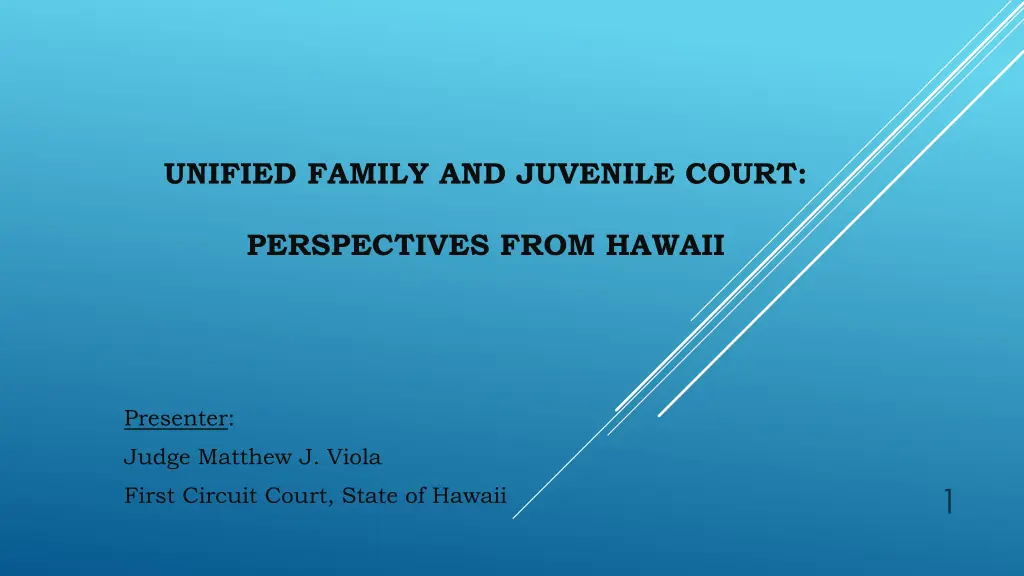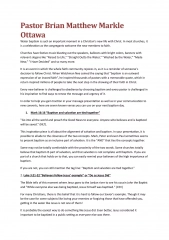
Family and Juvenile Court Perspectives in Hawaii
Explore the history and key features of Hawaii's Family Court, including its comprehensive jurisdiction over family and juvenile matters. Learn about the exclusive jurisdiction of the Family Court over various civil and criminal issues involving families and children, as well as the unique aspects of Hawaii's Juvenile Court system in handling law violators and status offenses committed by minors.
Uploaded on | 0 Views
Download Presentation

Please find below an Image/Link to download the presentation.
The content on the website is provided AS IS for your information and personal use only. It may not be sold, licensed, or shared on other websites without obtaining consent from the author. If you encounter any issues during the download, it is possible that the publisher has removed the file from their server.
You are allowed to download the files provided on this website for personal or commercial use, subject to the condition that they are used lawfully. All files are the property of their respective owners.
The content on the website is provided AS IS for your information and personal use only. It may not be sold, licensed, or shared on other websites without obtaining consent from the author.
E N D
Presentation Transcript
UNIFIED FAMILY AND JUVENILE COURT: PERSPECTIVES FROM HAWAII Presenter: Judge Matthew J. Viola 1 First Circuit Court, State of Hawaii
Brief History of Hawaiis Family Court: Hawaii s Family Court was created in 1965 by a legislative act. It is a division of the Circuit Court, which is the trial level court of general jurisdiction in Hawaii. In the United States, family courts are parts of the state, not the federal, court system. 2
Key feature of the Hawaii Family Court: Fully Unified Court comprehensive subject matter jurisdiction over all civil and criminal matters related to families and children. In 1965, the concept of a fully unified family court was relatively new in the United States. Even today, not all family courts in the United States are fully unified. There is significant variability in the organizational structure of family courts in the United States. 3
Hawaii Family Court Jurisdicton Jurisdiction over Family Court Matters: Hawaii Family Court has exclusive original jurisdiction over civil familycourt matters including: marriage dissolution (divorce); child custody; child support, paternity; domestic/family violence; adoptions; guardianships; involuntary incapacitated adults. It also has criminal jurisdiction over adult crimes involving families and children. hospitalization of Citation: Hawaii Revised Statutes 571-11 and 571-14 (Endnotes 1 and 2) 4
Juvenile Court Jurisdiction: Law Violators: Hawaii Family Court has exclusive jurisdiction over children (less than 18 years of age) who commit violations of the law that would be crimes if committed by an adult. Juvenile law violators are entitled to all constitutional rights and protections that adult criminal defendants have (such as the right to counsel, right against self- incrimination), with some exceptions, including that juveniles do not have the right to a jury trial. The goals of the juvenile justice system focus more on rehabilitation of the child, rather than on punishment. Juveniles, however, can be held in custody at a juvenile detention facility operated by the Judiciary or at a youth prison, operated by the State of Hawaii. Juveniles can also be placed at a non-secure shelter. Juvenile law violators can also be placed on probation. The Judiciary employs probation officers to supervise these youth while they are living in the community. 5 Citation: Hawaii Revised Statutes 571-11 (Endnote 2)
Juvenile Court Jurisdiction: Status Offenses: Family Court has exclusive jurisdiction over children who commit status offenses. Status offenses are noncriminal acts that are only illegal for a minor to commit. Adults can legally engage in the same behavior. Examples of status offenses include: truancy, running away, violating curfew, being beyond the control of a parent. Citation: Hawaii Revised Statutes 571-11 (Endnote 2) 6
Juvenile Court Jurisdiction: Child Abuse and Neglect: The Hawaii Family Court has exclusive jurisdiction over cases involving the abuse or neglect of children by their parents. Citation: Hawaii Revised Statutes 571-11 (Endnote 2) The purpose of these cases is to protect children who have been neglected or abused by their parents. Children who have been abused or neglected can be placed in the foster custody of the State of Hawaii (Child Welfare Services). If parents cannot provide a safe home for their children within a reasonable period of time, their parental rights may be terminated. Their children will then be permanently placed with another family through an adoption or guardianship, typically. Parents have a fundamental constitutional right to care for and raise their children. Because this fundamental right is at risk in child abuse and neglect cases, parents have a constitutional right to legal counsel. The Family Court provides legal counsel to indigent parents. The Family Court also appoints a guardian ad litem to represent the best interests of the children in each case. 7
Founding Principle of Hawaiis Unified Family Court: When Hawaii s unified Family Court was created in 1965, it was given exclusive and comprehensive subject matter jurisdiction over all civil and criminal matters related to families and children based on the principle belief that a unified Family Court is the optimal organizational structure to help children and families -- which is the fundamental goal of Hawaii Family Court (Endnote 5). 8
Goal of Presentation: Because both of our courts (Hawaii and Mongolia) share the same goals and values of helping families and children, my goal in this presentation is to share some of the features and experiences of Hawaii s unified Family Court, which may be useful to the Mongolian Judiciary as it prepares to implement its unified Family and Juvenile Court. 9
Why do we believe that a combined Family and Juvenile Court is the optimal organizational structure to help families and children? One Very Important Reason:* Specialized Expertise: Hawaii s unified Family Court allows judges, through specialized training and experience, to develop expertise, knowledge and skills in the complexities and dynamics of families, children, and in family law that lead to better decision-making and better outcomes for families and children. *Please refer to Endnote 3 for additional reasons. 10
Family and Juvenile Cases Are Different From Other Cases: Family and juvenile cases are unique and require judges to have skills and a knowledge base that, in many ways, are different from those needed in most other civil and adult criminal cases. 11
Some reasons why the nature of family and juvenile cases are different from most other civil and adult criminal cases: They are usually more emotionally charged because they often deal with the most intimate and personal details of the parties lives and relationships that are extremely important to parties. In contrast to most other civil and adult criminal case types, the relationship between the parties such as parents and their children-- often continues after the court case is resolved. Family court cases, particularly divorce cases, may present complex and multi- disciplinary legal issues, requiring a judge to be familiar with finances and accounting, tax laws, military law, contract law, property law, bankruptcy law, and trust and estate law. In contrast with most civil and criminal cases that focus on reconstructing past events and imposing consequences for past actions, family law cases frequently involve assessing past behaviors in order to predict forward-looking matters. For example, in child custody cases, the family court judge must assess past information and evidence to craft orders that will be in the best interests of a child in the future. 12
Juveniles (children) are fundamentally different from adults: Juveniles are still developing cognitively, emotionally, and socially. Adolescents brains are still maturing especially areas involved in judgment, impulse control, and risk assessment. The goals of the Hawaii juvenile justice system is more rehabilitative and restorative comparison to the adult criminal justice system. (Citation: Hawaii Revised Statutes 571-1 (Endnote 4)) rather than punitive, in Children generally have more capacity to change than adults 13
We believe that it is important that judges specialize in family and juvenile courts Because family and juvenile cases are different in many respects from most other civil and adult criminal cases, in Hawaii we believe that it is essential that judges specialize in family and juvenile courts so that they can develop the expertise and skills in a broad range of topics to properly adjudicate these cases. 14
Important Clarifying Note: Although family and juvenile court cases are different in important respects, Hawaii Family Court judges must still discharge their judicial duties as any other judge would. The judge must still decide cases neutrally and fairly according to the substantive and procedural rules and laws. For example, In juvenile cases, the judge must follow the same rules of evidence that apply in adult criminal cases and ensure that constitutional due process rights are protected in the same manner as in adult criminal cases. 15
How Hawaiis unified Family Court has allowed judges to develop the necessary expertise: 1. Exclusive focus on family and juvenile cases for extended tenures allows judges to develop expertise over time -- Experience is the best teacher . 2. Allows specialized training in areas that are specific to family and juvenile cases. 16
We specialized training is essential: believe that ongoing, multidisciplinary and Hawaii s unified Family Court structure allows us to provide training to judges assigned to the Family Court that is focused on the specific and unique topics they must be expert in. Hawaii Family Court judges typically receive more than 40-50 hours of training from subject matter experts each year. This is in addition to the general judicial education all Hawaii judges receive. 17
Some examples of topics Hawaii Family Court judges receive training on: Emotional and psychological trauma Child development and family dynamics Developmental differences between children and adults Child custody and age-appropriate timesharing schedules Domestic violence extremely important Child abuse and neglect Substance abuse and addiction Mental health Alternative dispute resolution mediation, arbitration Financial statements Bankruptcy Alimony/spousal support Child support 18
Other Benefits of Hawaiis Unified Family Court: In addition to developing the necessary expertise to properly adjudicate family and juvenile cases, in Hawaii we have found that there are other benefits to having a unified family court: 1. Identifying and Developing Solutions to Systemic Issues: Because Family Court judges focus exclusively on issues related to families and children, they are well-positioned to identify and develop solutions to systemic issues affecting children and families. Example: Domestic Violence Protection Orders (No Contact Orders) a. We have found that domestic/family violence is alarmingly prevalent in our society; the volume of cases is extremely high. b.In order to address the high volume of cases, we have a dedicated docket in our Family Court for civil domestic violence orders for protection (no contact orders). c. We have designated a specialized criminal docket that covers violations of orders for protection protection orders may be ineffective without effective criminal enforcement mechanisms. d.To assist victims of domestic violence, we have Judiciary staff assigned to help victims file petitions for protection orders. 19 e. We have developed standardized forms. f. We have coordinated with law enforcement to serve protection orders.
2. A unified Family Court has allowed us to be innovative: Examples: Juvenile Justice Reform Initiatives The Hawaii legislature has declared that it shall be a policy and purpose of [family] courts to promote the reconciliation of distressed juveniles with their families, foster the rehabilitation of juveniles in difficulty, render appropriate punishment to offenders, and reduce juvenile delinquency. Citation: Hawaii Revised Statutes 571-1 (Endnote 4) Hawaii Family Court, in collaboration with other government agencies and community partners, has initiated some significant changes to the juvenile justice system that align with the stated purpose of Family Court. 20
Juvenile Detention Alternatives Initiative: The goal of this initiative is to reduce the number of children who are incarcerated, which research and experience have shown can be harmful and have lasting negative impacts on children. Started over 15 years ago, the initiative has drastically reduced the number of children who are incarcerated without compromising public safety. Juvenile Justice Reform: In 2014, the Hawaii legislature enacted significant revisions to the juvenile justice statutes to codify changes that promote the rehabilitation of justice-involved youth and reflect a more therapeutic and restorative approach. The law focused on reducing secure confinement, strengthened community supervision, and focused resources on practices proved to reduce recidivism. Diversion: The Hawaii Family Court, in partnership with other government and community- based organizations, has recently been working to develop culturally-based programs and systems to divert first-time youthful offenders from formal involvement in the juvenile justice system. The goal is primarily preventative: Early and meaningful intervention is intended to mitigate risks that the juvenile continues to engage in harmful behaviors. 21
Specialty Courts: Hawaiis Family Court has created several SpecialtyCourts within the larger Family Court organizational structure, which address specific areas of need for participants and employ a therapeutic or restorative approach: Juvenile Drug Court: Provides treatment and intensive supervision for juvenile law violators who have substance use disorders. Girls Court: Provides intensive supervision to girls 14 years and older who are law violators or status offenders. The court recognizes that girls in the juvenile justice system have gender-specific issues that must be identified and addressed in a gender- informed way. The supervision is individually tailored to each girl s needs and provides supports in all needed areas including but not limited to substance abuse, mental health, education, family relationships, domestic violence, child sexual exploitation. Family Drug Court: In child abuse and neglect case, the Family Drug Court provides intensive judicial monitoring and supports to parents who have substance abuse issues. Truancy Court: This court works with public schools and other stakeholders to help teens who are not attending school (status offenders). Early Education Intervention Program. This program works with parents who have elementary school children with school attendance problems. 22
Some Concluding Thoughts: Highly commend Mongolia s Judiciary, particularly Justice Khosbayar Chagdaa, Legislature and your community for its wisdom in prioritizing children and families by aligning the organizational structure of its Family and Juvenile Courts with its values. Humbly, if there is anything we in Hawaii can do to assist the Mongolia Judiciary as it implements its combined Family and Juvenile Court, we would be more than willing to help. 23
Endnotes Endnote 1: Hawaii Revised Statutes 571-14 Jurisdiction; adults. (a) Except as provided in sections 603-21.5 and 604-8, the court shall have exclusive original jurisdiction: (1) To try any offense committed against a child by the child's parent or guardian or by any other person having the child's legal or physical custody, and any violation of section 707-726, 707-727, 709-902, 709-903, 709-903.5, 709-904, 709-905, 709-906, or 302A-1135, whether or not included in other provisions of this paragraph or paragraph (2); (2) To try any adult charged with: (A) Deserting, abandoning, or failing to provide support for any person in violation of law; (B) An offense, other than a felony, against the person of the defendant's husband or wife; (C) Any violation of an order issued pursuant to chapter 586; or (D) Any violation of an order issued by a family court judge. In any case within paragraph (1) or (2), the court, in its discretion, may waive its jurisdiction over the offense charged; (3) In all proceedings under chapter 580, and in all proceedings under chapter 584; (4) In proceedings under chapter 575, the Uniform Desertion and Nonsupport Act, and under chapter 576B, the Uniform Interstate Family Support Act; (5) For commitment of an adult alleged to be mentally defective or mentally ill; (6) In all proceedings for support between parent and child or between husband and wife; (7) In all proceedings for pre-trial detention or waiver of jurisdiction over an adult who was a child at the time of an alleged criminal act as provided in section 571-13 or 571-22; (8) In all proceedings under chapter 586, Domestic Abuse Protective Orders; and (9) For the protection of vulnerable adults under chapter 346, part X. In any case within paragraph (3), (4), or (6), the attorney general, through the child support enforcement agency, may exercise concurrent jurisdiction as provided in chapter 576E. (b) The court shall have concurrent jurisdiction with the district court over violations of sections 707-712, 707-717, 707- 722, 708-822, 708-823, 710-1010.5, 711-1106, and 711-1106.5 when multiple offenses are charged through complaint or indictment and at least one offense is a violation of an order issued pursuant to chapter 586 or a violation of section 709-906. (c) The court shall have concurrent jurisdiction with the circuit court over violations of section 711-1106.4. [(d)] The court shall have concurrent jurisdiction with the circuit court in all proceedings to appoint a guardian of an adult. 24
Endnote 2: Hawaii Revised Statutes 571-11 Jurisdiction; children. Except as otherwise provided in this chapter, the court shall have exclusive original jurisdiction in proceedings: (1) Concerning any person who is alleged to have committed an act before achieving eighteen years of age that would constitute a violation or attempted violation of any federal, state, or local law or county ordinance. Regardless of where the violation occurred, jurisdiction may be taken by the court of the circuit where the person resides, is living, or is found, or in which the offense is alleged to have occurred; (2) Concerning any child living or found within the circuit who is: (A) Neglected as to or deprived of educational services because of the failure of any person or agency to exercise that degree of care for which it is legally responsible; (B) Beyond the control of the child's parent or other custodian or whose behavior is injurious to the child's own or others' welfare; (C) Neither attending school nor receiving educational services required by law whether through the child's own misbehavior or nonattendance or otherwise; or (D) In violation of curfew; (3) To determine the custody of any child or appoint a guardian of any child; (4) For the adoption of a person under chapter 578; (5) For the termination of parental rights under sections 571-61 through 571-63; (6) For judicial consent to the marriage, employment, or enlistment of a child, when consent is required by law; (7) For the treatment or commitment of a mentally defective or mentally ill child, or a child with an intellectual disability; (8) Under the Interstate Compact on Juveniles under chapter 582 or the Interstate Compact for Juveniles under chapter 582D; (9) For the protection of any child under chapter 587A; (10) For a change of name as provided in section 574-5(a)(2)(C); (11) Concerning custody or guardianship of an immigrant child pursuant to a motion for special immigrant juvenile factual findings requesting a determination that the child was abused, neglected, or abandoned before the age of eighteen years for purposes of section 101(a)(27)(J) of the federal Immigration and Nationality Act. For the purposes of this paragraph, "child" means an unmarried individual under the age of twenty-one years; and (12) Concerning emancipation of a minor pursuant to section 577-25. 25
Endnote 3: Some Additional Advantages of Fully Unified Family Court: Efficiency and Convenience: Court users may have better access to justice if one unified court as opposed to several courts has jurisdiction over all family-related legal cases (some families have more than one case). Consistency in Judicial Rulings: One Judge/One Family principle may lessen the likelihood of inconsistent rulings on legal issues. Access to Resources: May lead to better coordination and referrals to community-based and court-provided social and dispute resolution services. Focus of the Court: May clarify that the focus and mission of family courts are to help resolve both legal and non-legal problems affecting families and children. 26
Endnote 4: Hawaii Revised Statutes 571-1 Construction and purpose of chapter. This chapter shall be liberally construed to the end that children and families whose rights and well-being are jeopardized shall be assisted and protected, and secured in those rights through action by the court; that the court may formulate a plan adapted to the requirements of the child and the child's family and the necessary protection of the community, and may utilize all state and community resources to the extent possible in its implementation. This chapter creates within this State a system of family courts and it shall be a policy and purpose of said courts to promote the reconciliation of distressed juveniles with their families, foster the rehabilitation of juveniles in difficulty, render appropriate punishment to offenders, and reduce juvenile delinquency. The court shall conduct all proceedings to the end that no adjudication by the court of the status of any child under this chapter shall be deemed a conviction; no such adjudication shall impose any civil disability ordinarily resulting from conviction; no child shall be found guilty or be deemed a criminal by reason of such adjudication; no child shall be charged with crime or be convicted in any court except as otherwise provided in this chapter; and all children found responsible for offenses shall receive dispositions that provide incentive for reform or deterrence from further misconduct, or both. The disposition made of a child or any evidence given in the court, shall not operate to disqualify the child in any civil service or military application or appointment. Any evidence given in any case under section 571-11 shall not in any civil, criminal, or other cause in any court be lawful or proper evidence against the child for any purpose whatever except in subsequent cases involving the same child under section 571-11. (Emphasis added.) 27
Endnote 5: Vision/Mission Statement of the Family Court of the First Circuit: The mission of the Family Court of the First Circuit is to provide every family, child and individual under its jurisdiction with equal access to fair, efficient, culturally aware, and timely justice. It is a court committed to therapeutic and restorative justice within the parameters of the law. Family Court is a place of healing for children and families 28






















